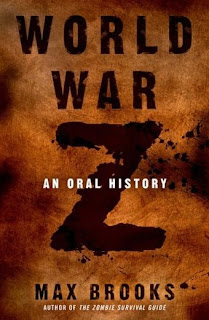
*exerpted from an email to joel miron
So, as to World War Z. The novel was overall enjoyable, to be sure. Max Brooks' previous work The Zombie Survival Guide, while interesting is primarily comical and easily overlooked. WWZ on the other hand gives us new and interesting ground in zombie thought.
First off, the way it is written is new and interesting (or as new and interesting as you can be in our post-Shakespeare world). The 'oral history' of the Zombie Wars is told in a huge array of voices and, for the most part, Brooks captures those voices interestingly. The premise of the book sometimes necessitates selling some of the best stories short, not giving us enough time with them, but I think it does the story service. I also find it wildly amusing that Brooks finds some answers to some questions that have been weighing heavily in my mind (and disproving some very minor points from my thesis). Seeger claims that zombies
"can also be thought of as life that merely meets the requirements for biological existence. While the zombies are dead humans, upon reviving they behave in a way that approximates life, by consuming, presumably excreting (or zombies in later films would be bloated having fed for so many years) and performing a kind of reproduction by creating more zombies. Although the zombie condition in Romero's films is environmental and not viral (that is, all dead humans rise from the dead, not just those who are bitten), the zombies still reproduce themselves either by killing humans or making for difficult living conditions, leading to human deaths, thereby creating more zombies. The zombies are in some sense alive, even if they can no longer be considered human life (Seeger 12)
Additionally, while i thought there was a fair amount of 'in China people are like... in South America people are like...' i think Brooks does quite an amazing job of making characters not sound unique and (usually) interesting. Brooks seems like the type of zombie fan who plays through a lot of scenarios, somewhat regularly visits zombiedefense.org, and has seen every zombie movie ever made. Overall, i enjoyed the experience (though i had it a while back) and think there's more to look at there, but not, ultimately, a lot more...
Huh. On reading WWZ I'd occasionally ponder how it is that zombies move. Movement requires energy which, for living creatures, requires eating. But, while zombies clearly eat, they don't seem to extract any energy from their victims (which would turn into zombie poop).
ReplyDeleteNow, before I get all "Jeez, zombies are totally unrealistic!" I have to remind myself about the mysteries of viruses (a reminiscence which your comment about "viral" vs. "environmental" zombification sparked): Viruses reproduce and move, but I don't think we really know how they move- as far as we know they don't extract energy from their environment, either. So, (and probably zombie scholars have beaten this to death) viruses = zombies. Tiny zombies are among us! And, in a very real way, are a threat to our way of life.